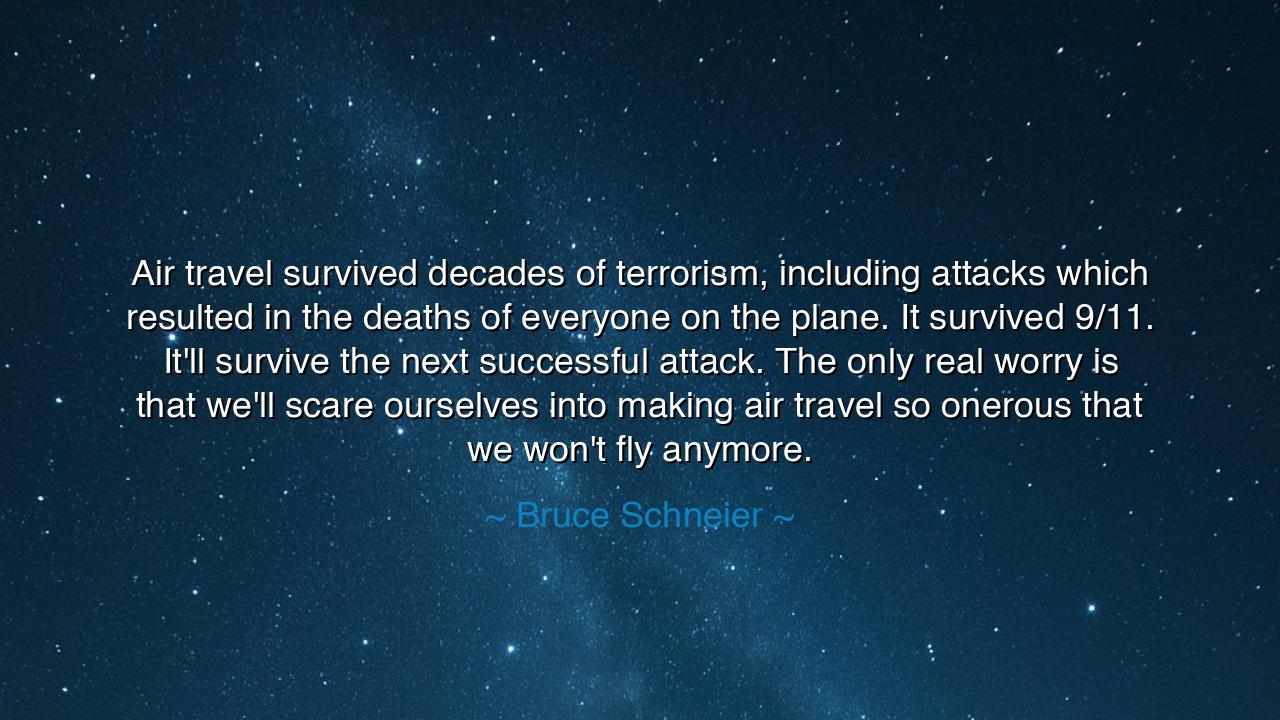
Air travel survived decades of terrorism, including attacks
Air travel survived decades of terrorism, including attacks which resulted in the deaths of everyone on the plane. It survived 9/11. It'll survive the next successful attack. The only real worry is that we'll scare ourselves into making air travel so onerous that we won't fly anymore.






Bruce Schneier, master of security’s hidden truths, once said: “Air travel survived decades of terrorism, including attacks which resulted in the deaths of everyone on the plane. It survived 9/11. It'll survive the next successful attack. The only real worry is that we'll scare ourselves into making air travel so onerous that we won't fly anymore.” In these words is both comfort and warning. For he tells us that the systems of the world, though shaken, endure; yet he also warns that it is not the strength of enemies that may undo us, but our own fear magnified into chains.
When Schneier speaks of air travel surviving decades of terrorism, he invokes the long history of struggle between progress and danger. From the hijackings of the 1970s to the burning towers of 9/11, the skies have known tragedy. And yet, the people returned. They boarded planes again. Nations strengthened their vigilance, and the wings of commerce and human connection took flight once more. This endurance is no accident—it is the resilience of humanity refusing to surrender the gift of movement to those who would strike fear.
Yet his words cut deeper. He tells us plainly that the next successful attack will come, for in an imperfect world, no defense is perfect. But still, he declares with certainty: we shall survive. For the true enemy is not the destruction of a single flight, but the paralysis of a people. When the heart of a nation trembles so deeply that it strangles itself with fear, then it has fallen, even if its enemies never strike again. Fear, not violence, is the sharper weapon.
History echoes this lesson. Recall the days of Rome, when Hannibal marched across the Alps with elephants, striking terror into the heart of the Republic. Rome could have collapsed in panic at such a sight. But though their fields were ravaged and their armies broken, they endured—because they refused to let fear govern them. Later, in more recent memory, after the London Blitz of World War II, when bombs fell nightly upon the city, the people still went about their lives. Churchill declared, “We shall never surrender,” and their courage defied the terror meant to break them. So too, Schneier urges us to remember: endurance is not merely survival, but the refusal to be ruled by fear.
The true danger, Schneier warns, is the onerous burden we place upon ourselves. If we make air travel so encumbered with suspicion, searches, and endless barriers, then we ourselves will ground the very gift that technology gave us. The terrorists’ dream is not simply to kill, but to shatter confidence, to make us limit our own freedom. Thus, the lesson is clear: vigilance is needed, but balance is wisdom. Overreaction is itself a victory for those who seek to control us through fear.
Therefore, O listener, take this teaching to heart: do not let fear shape your destiny. Travel still, fly still, live still. Protect your people with prudence, but do not sacrifice freedom upon the altar of safety. Remember always that courage is the lifeblood of civilization, and that surrendering to fear is the slow death of nations.
So let Bruce Schneier’s words be etched upon your soul: “Air travel survived… the only real worry is that we'll scare ourselves into making air travel so onerous that we won't fly anymore.” The path of wisdom is not to deny danger, but to endure it with strength. Fear may whisper, but let courage answer louder. For as long as we choose to keep living fully, no terror can truly win.






AAdministratorAdministrator
Welcome, honored guests. Please leave a comment, we will respond soon